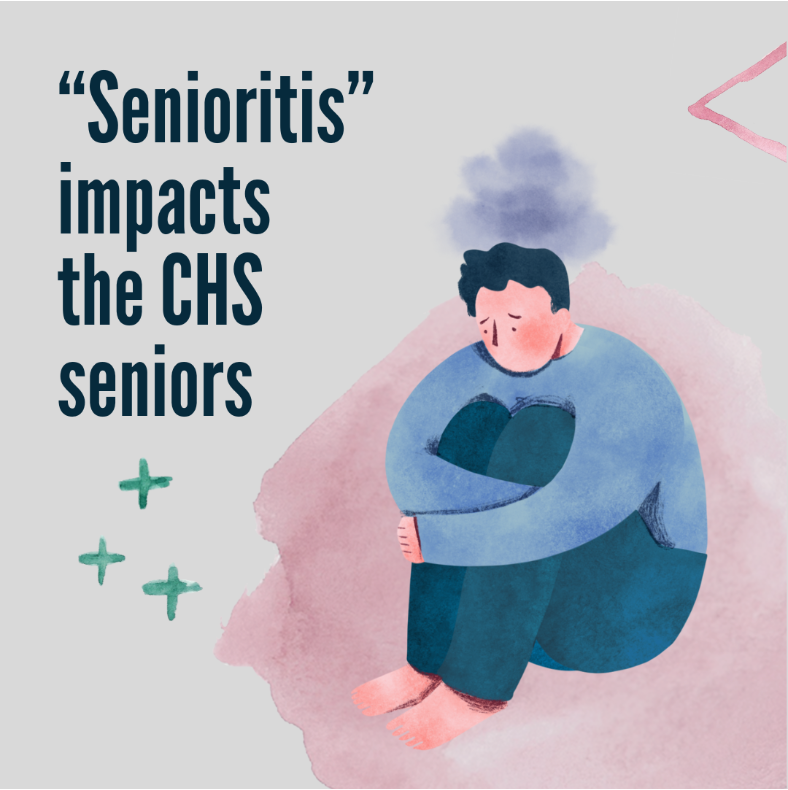Students in their last year of high school are said to suffer from a condition known as “senioritis,” which is characterized by a drop in motivation or performance. Though many question the logistics behind the supposed concept “senioritis.” In other words, is it an actual condition or is it because seniors are tired of being held accountable?
Senior Jordan Matalon explains how “senioritis” affected him and his friends at CHS.
“From the beginning of this year, maybe even the end of Junior year I developed senioritis,” said Matalon. “Which I know seems impossible, which it’s not. I have been so unmotivated. I think it looks like not doing your work and procrastinating. I really just don’t care anymore and I’m tired of school. It’s been twelve long years and I’m ready to go on into the next chapter. [Senioritis] has definitely happened to me personally and I witnessed it among my friends as well.”
Senior Mentoa Mckenzie explains the opposite view of “senioritis,” how it’s only excuses made by tired seniors.
“I believe senioritis is a result of not having accountability and people feeling like they don’t have to do certain things and not abide by rules because they are older,” explained Mckenzie.
CHS history and Social Justice teacher, Adam Weinstein, explains that as long as you complete all your work and hold yourself accountable, it’s understandable to slack off.
“Some of the students that I have, got senioritis way before they became seniors,” said Weinstein. “You know, a little bit of it to me can be understandable, though I think sometimes it can be mistaken for being lazy, but I understand the tendency. But a lot of seniors who are excited for college, remember you are just getting started. As long as you handle your business you should be okay.”
CHS girls golf coach and the Government and Econ teacher comments on “senioritis,” blurring the line between present and the future.
“Senioritis is real on the sports field and in the classroom,” said Novak. “Students find out where they are going to college. They tend to focus on the future and not the present. Sometimes they tend not to be as committed on the field because of this.”
Wellness Center counselor, Lisa Lucore, provides insight on more background to “senioritis,” that it may have roots in an actual psychological phenomenon.
“Senioritis is that term that we use for seniors who are on the way out,” said Lucore. “There’s definitely this idea that “I’m almost done! I can’t wait!” You’re anticipating the end coming. It becomes harder and harder to do the actual day-to-day stuff. And then often the day-to-day stuff gets pushed away, there’s procrastination involved. This is for anyone in a position that has an end date. I’ve heard it referred to us as “Short Time Syndrome.””
Lucore explains what “Short Time Syndrome” means.
“It’s anytime that you know something is coming to an end that you can’t wait for,” said Lucore. “You know it’s like an exciting end. There’s gonna be this buildup of anticipation to the point where it makes the normal stuff that you’ve been doing feel monotonous. It makes it feel difficult. It makes it feel like you’re gonna kinda lose your mind because you’re having to do this thing. That seems so small when you have this big end goal in mind.”
Lucore gives advice on how to pass through this hardship.
“Go ahead and mark up a calendar,” said Lucore. “I think having a visual reminder of things that are coming up and I mean a paper like old-school paper on the wall kind of calendar where you can see the events, the senior picnic, you can see the trips you can see so that you can keep a feeling of time.”
Academic Academic counselor David Rivas comments on how senior students may feel as hitting their second semester.
“Seniors, by the time you hit second semester, you’ve already gotten your decisions from colleges,” explained Rivas. “You’re not worrying about next year. A lot of the time seniors will feel like they’re already done even though they still have a semester left. There’s a genuine feeling of like what am I really working for anymore? I’ve already got my college decision or I already know what I’m doing after high school.”
Rivas continues to give advice to seniors who are impacted by “senioritis.”
“In a lot of conversations I have with my seniors I always say to hang in there and keep doing what you need to do,” said Rivas. “Don’t blow it. I’ve only ever had one student do so poorly that they actually lost the college admissions because of their second semester performance. It is a thing so I firmly believe that seniors don’t necessarily get lazy. I believe that there’s less motivation to continue to do really well because everything you’re working towards you. Kind of already figured out by the time spring semester rolls around.”
A drop of scholar performance from seniors is expected as the idea of “senioritis” was formed or “Short Time Syndrome,” a psychological phenomenon. There is a fine line between making excuses to not doing any work and slacking off in school due to a drop in motivation. Remember that lacking average performance and behavior can lead to harsh consequences. Keep in mind the goals and everything you have worked towards as a student.
If ever dealing with harsh realities of being a senior, remember to use the available sources at CHS. Make appointments with the academic counselors and wellness counselors. And keep constant communication with your teachers to restore any drops of motivation.















